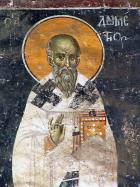Holy Martyrs Menas, Hermogenes and Eugraphus 12/23/2013
Menas and Hermogenes were Athenians by birth. They both lived in Constantinople, held in high regard by the Emperor and the citizens. Menas was known for his high education and his brilliant eloquence, and even though he appeared to be a pagan, he was a secret Christian. Hermogenes was Prefect of Constantinople and he adhered to idolatry, although he was merciful and did great many good deeds. At one time there began an uproar owing to disputes between Christians and idolaters in Alexandria, and the Emperor Maximinus sent Menas to settle the dispute and to extinguish Christians from the city. Menas went to Alexandria and re-established peace, but declared himself as a Christian and converted many pagans to the true faith by his wise words and an abundance of miracles. Upon hearing of this, the Emperor sent Hermogenes to punish Menas and to extinguish Christianity. Hermogenes had Menas brought to trial, had his feet cut off and his tongue torn out, his eyes pierced and then thrown into prison. That night the Lord Jesus Christ Himself appeared to Menas and healed all his wounds and encouraged him. Upon seeing Menas miraculously healed, Hermogenes received holy Baptism and began preaching the word of truth. He was elected Bishop of Alexandria. The enraged Maximinus went to Alexandria himself and put Menas and Hermogenes to cruel tortures, which they, supported by God’s grace, endured courageously. At the sight of the bravery of these soldiers of Christ and the miracles that were wrought during their tortures, Eugraphus, the secretary of Saint Menas and a friend of his, appeared before the tribunal and cried out:” I am a Christian, too!” The Emperor, beside himself with rage, seized the sword and slew Eugraphius with his own hands. After this, the impious Emperor ordered Menas and Hermogenes to be beheaded without further delay. Their holy relics were thrown into the sea, but they miraculously sailed to Constantinople, where the Bishop, having learned of this in a dream, welcomed them solemnly and buried them with devotion.
